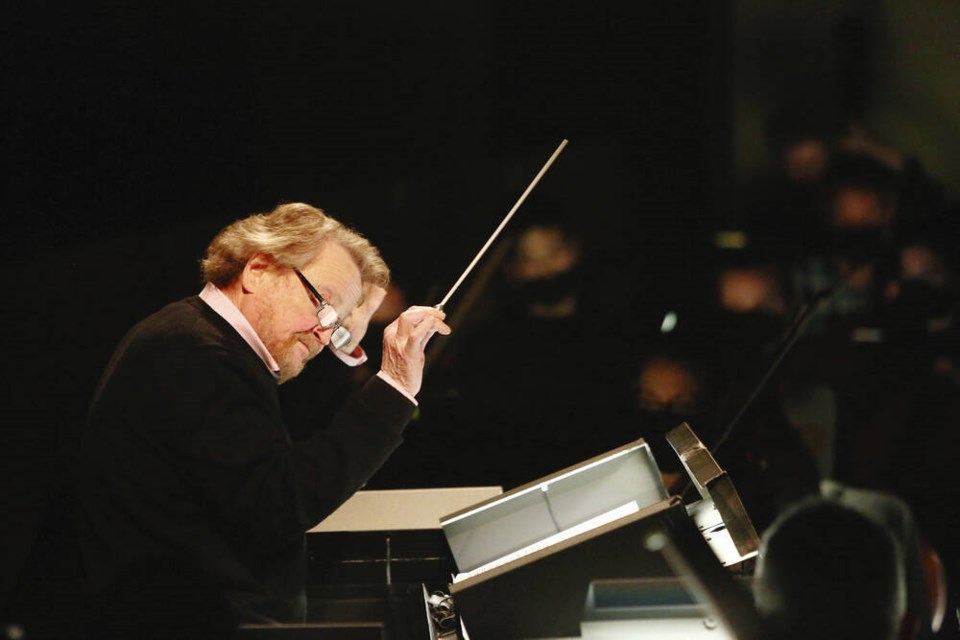DIE WALKÜRE
Where: Royal Theatre, 805 Broughton St.
When: Oct. 9-21
Tickets: $36-$186 from the Royal McPherson box office (250-386-6121) or rmts.bc.ca
There’s big, there’s gigantic — and then there’s Die Walküre.
Pacific Opera Victoria has at the ready its first-ever production of the Richard Wagner classic, which took the German composer 25 years to complete and is known for its complexity and girth. It premieres next week at the Royal Theatre with statistics that include three intermissions and an estimated run time of nearly five hours.
With a big footprint comes big expectations, but an immense amount of advance preparation has conductor Timothy Vernon certain that the Pacific Opera cast and crew, with members of the Victoria Symphony on board for the rollicking ride, can pull it off.
“Die Walküre is one of the greatest artistic creations in Western art,” said Vernon, the founding artistic director of Pacific Opera. “Very few things are of this scope and scale.”
The company made waves in 2014 when it staged another Wagner classic, Das Rheingold, on its own for the first time in Canada. Das Rheingold is normally together with Die Walküre, Siegfried or Götterdämmerung, which make up Wagner’s infamous Ring cycle. When performed in full, it can run for up to 17 hours.
Das Rheingold was pithy by comparison, the two-hour appetizer to Die Walküre’s four-hour entrée.
“People always say Wagner, it must be hard to sing, because it’s so long,” Vernon said. “But the fact is, if you’ve got the right voice, it isn’t that hard. He wrote for a certain kind of voice, and you have to have that to begin with. You have to have the right equipment.”
Pacific Opera’s production of Die Walküre features Viktor Antipenko (tenor), Aviva Fortunata (soprano), Jennifer Maines (soprano), Mark Delavan (bass baritone), Allyson McHardy (mezzo-soprano) and Simon Wilding (bass), an experienced cast well-suited to the task at hand, Vernon said. Each role requires a unique skill set. Fortunata, for example, is considered a dramatic soprano, a designation for singers “with major voices and major carrying power,” he added.
“They are not for the La bohèmes and La Traviatas at all. They are very different animals. Aviva has great technique, but she has that power that can cut right through an orchestra. It’s stunning when she sings.”
Wagner wrote Die Walküre for more than 100 players, with 16 first violins and 16 second violins among the head-spinning requirements. Audiences no longer require the operatic gigantism that was popular in the late 19th century, which has opened up Wagner’s work to modern-day operaphiles. Several adaptations that are available work with a reduced footprint, which is how Pacific Opera staged Das Rheingold in 2014 with a 40-member orchestra.
That is in the neighbourhood of what has been assembled for Die Walküre, which will be sung in German with English surtitles.
“The disadvantage is that you don’t get that huge wall of sound, like a tsunami washing over you,” Vernon said. “But you get more clarity, and more transparency. You can follow the musical arguments a little better, I think.”
Pulitzer Prize finalist Alex Ross, music critic for The New Yorker, considers Wagner the most widely influential figure in the history of music. In his 2020 bestseller, Art and Politics in the Shadow of Music, Ross looked at both the composer’s vast musical achievements and outspoken anti-semitism.
“He’s still controversial,” Vernon said. “But Wagnerians will travel the world to see Wagner performed. He has a huge following. The book is still not closed.”
Wagner’s work is not performed often, but not because of his politics.
“It’s hugely expensive — fundamentally so — because of the size of the orchestra.” Vernon said it requires a massive commitment from everyone involved. The start times for each performance have been adjusted to reflect the size and scope of the production: Evening performances on Oct. 9, 12, 18 and 21 start at 6 p.m., while the afternoon performance on Oct. 15 begins at 12:30 p.m.
Die Walküre is like the Olympic Games for brass players, who are relied on heavily.
“The orchestra, far from rejecting the whole idea, and finding it impossible, they have embraced it,” Vernon said. “How often do you get to play Wagner?”
Vernon said Wagner wrote the opera based on Nordic and German legends and characters, including the Brünnhilde. More than a century later, it has become a foundational myth for Germany, not unlike Homer’s work did for Greece.
“The country’s sense of identity is bound up with these works. Wagner wanted to provide the same thing for Germany, and create a sense of identity — not just historic, but mythic.”
Wagner’s score is known exclusively to many for Ride of the Valkyries, which arrives at the beginning of Act 3. From the opera’s premiere in 1870 onward, Valkyries is regarded as a signature piece, helped immeasurably by its inclusion (via helicopter-mounted loudspeakers) in the 1979 film, Apocalypse Now. The key?
“[Ride of the Valkyries] is excerptable,” Vernon said. “It has one of those earworm configurations. Wagner was way ahead of the game.”



